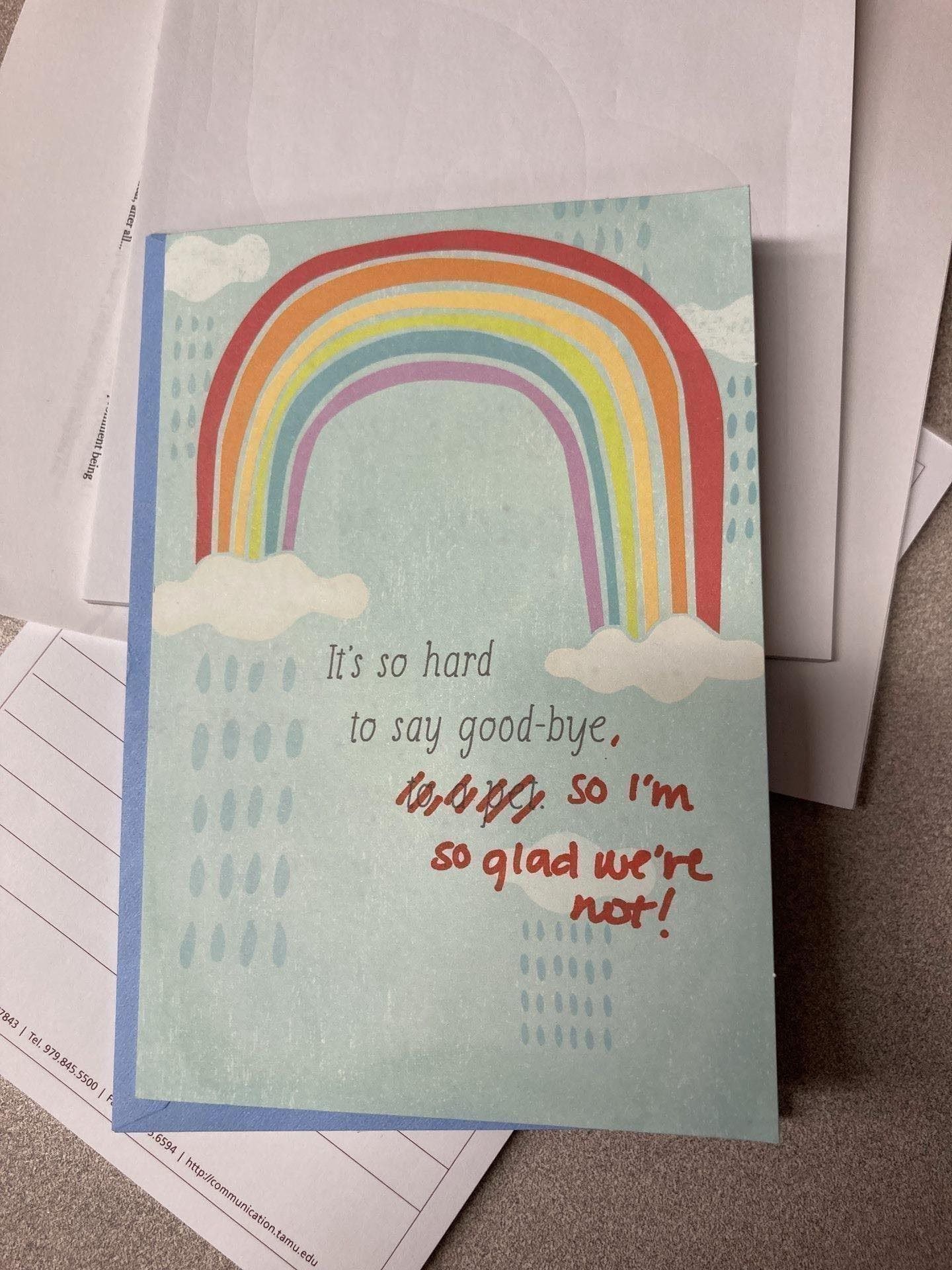November 2022

A Choice and a Justification
Delaney Couri
I had office hours with all three of my own professors over the course of the last week. You would think that subjects as disparate as the History of Gender and Sexuality, Media, Culture, and Identity, and Engaged Communication Research would all provide very different office hours experiences, yet they were all eerily similar. I went into their office (or Zoom room), sat down, made pleasantries, and then was saddled with the question; “So, what are you thinking?” What am I thinking? If rephrased slightly this gentle inquiry can become accusatory, as in, “What were you thinking?” but for the time being, we are still looking forward and hope beats out skepticism. So, what am I thinking…about that project, that paper, that syllabus?
“I have no idea.”
I didn’t say that, obviously, but I came close. Because, you see, my week was not just composed of office hours that I attended, it also included office hours that I led for my own students, two other job assignments that put me in a leadership role, and a meeting deciding my fate in the graduate program. No big deal. Just me, trapped over and over again, faced with the same question, “So, what are you thinking?”
Should I stay or should I go? Do I say yes or do I say no? By the end of the week, I was so worn out that if anyone asked me anything I felt like I was either going to burst into tears or snap entirely. My executive processing skills were done for.
After a day and a half of rest, I feel slightly better. I did, finally, just burst into tears to get it out of the way. I slept for hours and hours. I sat on my couch in sweatpants and watched football until my brain finally began to untwist itself from the knot I spent all week tying it into. And then I began again, looking at the documents with titles like “Project idea?!? and “Narrowing class ideas,” attempting to find anything that I could write about for fifteen to twenty pages. After hours and hours of staring, pulling sources, and doing what a friend and I lovingly refer to as “thought work,” I came up with something. It isn’t perfect, but it will have to do, because, at the end of the day, I just have to make a choice. Or, more accurately, I have to make a choice and a justification.
I am stealing this phrase from one of my favorite professors, but I don’t think it’s exclusive to her. In fact, I have heard many, many faculty members tell me the same thing in different words. Because the little secret of graduate school is this: There is no right answer. There has literally never been a right answer. All there is and all there will ever be are choices and justifications. We use this model of argumentation and decision making all the time. “I want this flavor of Halloween cereal because it is my favorite.” The choice? The best cereal
ever. The justification? Obviously, it’s the best flavor.
Now, for those of you looking to apply to graduate school, it is not ~quite~ that easy, but in truth it is not that hard, either. Don’t get me wrong, graduate school as a whole is a beast, but things from project ideas to teaching advice to what cereal to eat can all be narrowed down and fit within this adage; a choice and a justification.
The only tricky thing about this model of decision making is the slippery notion of a “justification.” Humans can (and have) “justified” their horrible actions for years using either a flawed moral compass or perverted view of justice. Those words, justice, justification, justified, they are incredibly powerful terms, (Just think of what we call the members of the highest court in the United States, Supreme Court Justices…), so it is important that when using this model, you think through your justifications carefully. This is the point where traditionally rational thought splits off from its more artistic (and unfairly undervalued) counterparts.
A justification for an engineer, for instance, may be fairly simple. That elevator can hold 400 pounds, so we will only put 300 pounds in it. While this seems straightforward, like everything else, that justification is shaped not just by pure mathematics, but also human interpretation. You see, you only put 300 pounds in an elevator capable of holding 400 pounds because of a built in safety factor, a number created by a human who one day decided that the best way to minimize risk is by placing a buffer around how well we think machines are capable of working. Still, these factors are typically agreed upon industry standards, making choices and justifications fairly easy to back up.
In the social sciences and humanities, justifications typically take the form of literature reviews and citations. I have never enjoyed literature reviews and completely did not understand why everything had to be grounded in the literature, but now that I have adopted the choice and justification model of thinking, I get it. Citations are a way for me to do less work. I don’t have to try to justify all of my choices on my own anymore, with my minimal credibility. Instead, I can rely on really smart people who have gone before me, pointing to them to justify my decisions. These justifications come with their own level of risk, as I may try to justify my thinking in a completely inappropriate way, citing out of context or misreading a text. But then again, if I can justify the way that I do use it, I can justify my own justification. And thus, the loop continues. Choice and justification. Choice and justification. Choice and justification. Over and over and over again.
This brings me back to the biggest choice I made this past week: the choice regarding what I was going to do with the next few years of my life. And in that meeting, I was asked a few key questions. “Do you want to graduate in May 2023 with another masters?” and “Do you want a Ph.D.?”
A choice. A big one.
At first when asked, I answered both questions quietly, and with a question in my voice. “No?” and “Yes?”
Another faculty member ended up making my justification for me. “Their choice, to complete their studies in four years, that is the strategic choice.” A justification. My choice was to stay and my justification? Well, because it is strategic to stay. Strategic is a polysemic word and the decision itself was polysemic, it had many meanings, interpretations, sub-choices and justifications.
But after a month of agonizing over this multifaceted choice, it’s over. And that is what matters. I made a choice and I justified it… and the powers that be agreed. My week of choices and justifications is over now, but I realize that does not mean that no one will ever ask me a hard question ever again. In fact, I have a feeling that even harder questions are coming-- and soon. As terrifying as that is, I know now that I can handle it. All it takes is a few deep breaths, a small pause, and a choice and a justification.
